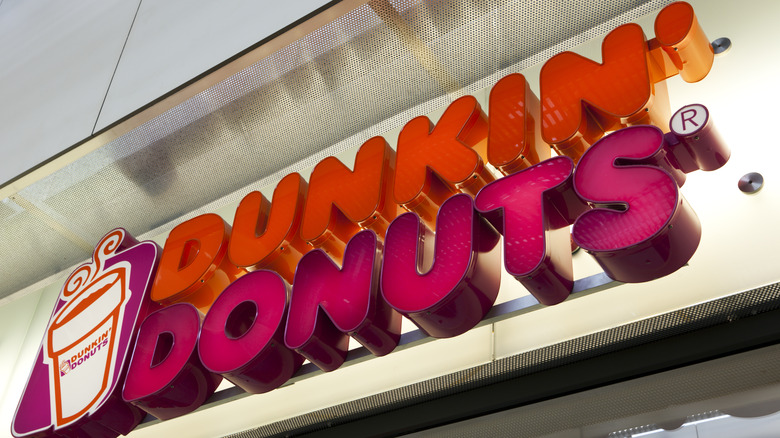The Controversial Ad Dunkin' Once Released Overseas
It's inevitable that companies will make mistakes, and a simple internet dive will likely bring up some unsavory moments from a corporation's history. These businesses are, after all, run by people, and we all know people are far from perfect. All the same, if a company's mistake causes pain for a large number of people, the public has every right to hold the business accountable for its actions and push those in charge to do better.
Dunkin' Donuts is one of those companies with a history that is far from spotless. Despite customers' unwavering love for the multinational corporation's coffee, breakfast sandwiches, and, of course, donuts, Dunkin' has had its fair share of scandals in the past. One of Dunkin's most notorious offenses in the recent past came in the form of an advertisement that ran overseas, but its American customer base did not hesitate to call out the public relations debacle.
The ad that sparked outrage
In 2013, Dunkin' Donuts released an advertisement in Thailand for its new product at the time, the Charcoal Donut. The ad shows a woman wearing pink lipstick whose face and upper body are covered in dark makeup and whose hair is styled in a 1950s beehive, holding the Charcoal Donut, which matches her artificially dark skin tone. The text on the image reads: "Break every rule of deliciousness."
Upon the ad's release, it faced immediate backlash among the American public. Human Rights Watch even called for the advertisement to be removed. HRW's deputy Asia director Phil Robertson said, "It's both bizarre and racist that Dunkin' Donuts thinks that it must color a woman's skin black and accentuate her lips with bright pink lipstick to sell a chocolate doughnut. Dunkin' Donuts should immediately withdraw this ad, publicly apologize to those it's offended and ensure this never happens again" (via NBC News).
The Dunkin' response
With its deeply racist roots, blackface is an absolute no-go in the United States. As Vox explains, the practice can be traced back to the 1800s' so-called "minstrel shows," in which white actors would portray African Americans in a demeaning, dehumanizing manner.
Thailand, however, does not share this abhorrent part of American history. According to The Guardian, the CEO of Dunkin' Donuts in Thailand was not so ready to own up to the blunder. He dismissed the backlash as "paranoid American thinking" and went on to say: "I'm sorry, but this is a marketing campaign and it's working very well for us." Shortly after, though, Dunkin' acknowledged the insensitivity of the stunt, apologized to the public, and removed the ad (via WUSA9).
No matter who the intended audience is, advertisements can easily reach different populations in the age of the internet. Even if that weren't the case, Dunkin' (or any company for that matter) will hopefully be more cautious when it comes to potentially hurtful and offensive advertisements from here on.


